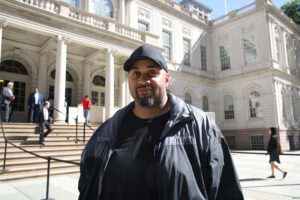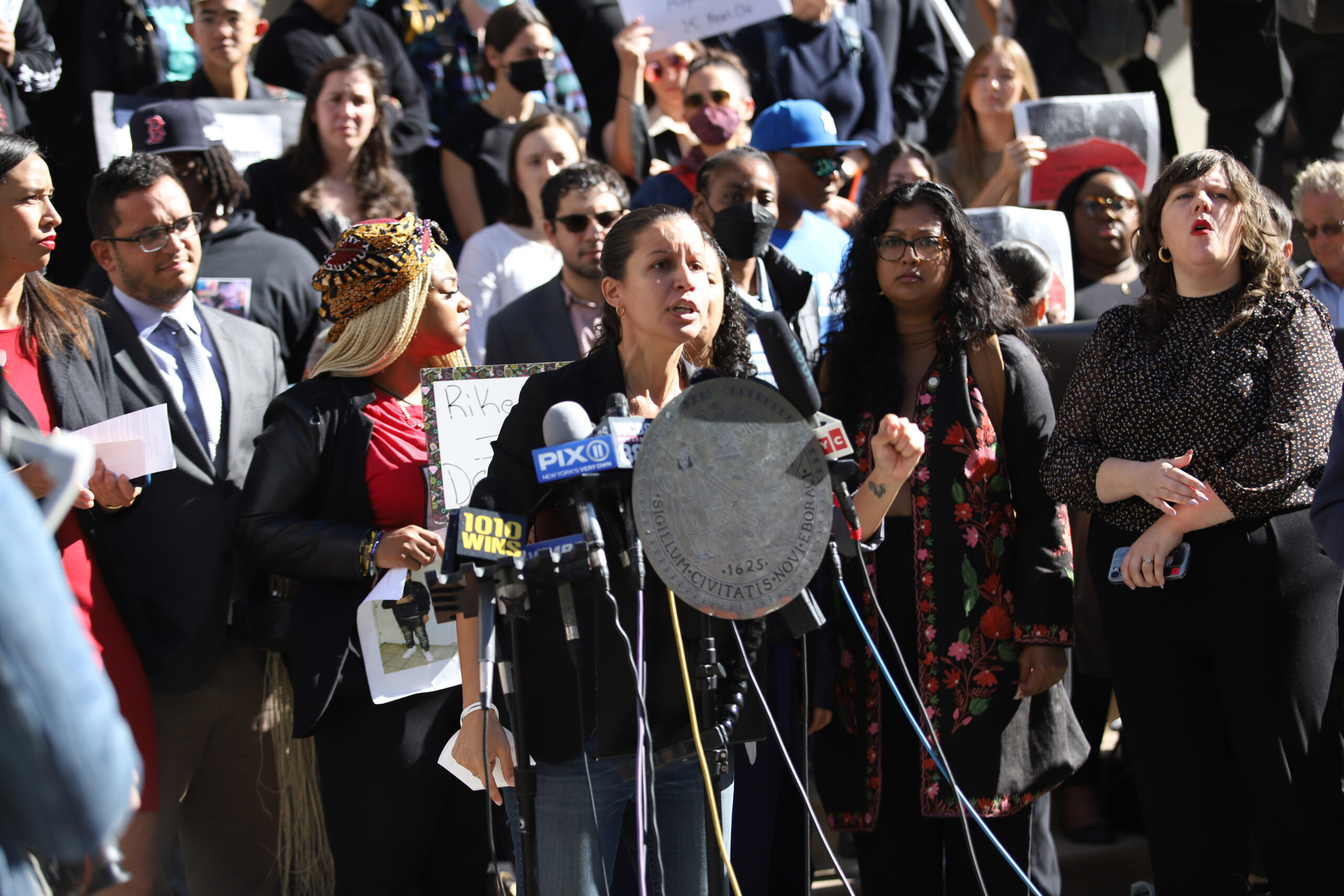Bronxite Kalief Browder was only 22 when he died by suicide in 2015, after spending two years in solitary confinment at Rikers Island. He is a central figure in an ongoing fight to pass legislation in the City Council to ban solitary confinement in city jails.
A rally on the steps of City Hall Wednesday drew a boisterous crowd of supporters urging passage of the bill, known as Intro. 549. NYC Public Advocate Jumaane Williams hosted the rally, along with Carlina Rivera, who chairs the Council’s Criminal Justice Committee, and Council members Tiffany Caban, Shahana Hanif, Lincoln Restler and Emily Gallagher.
But dozens of city corrections officers also showed up to voice vigorous opposition to the measure, saying that solitary confinement was a needed tool to keep city jails under control and to protect officers’ lives from violent inmates. At times, tension mounted as the two groups competed to be seen and heard.
Kalief Browder’s brother, Akeem Browder, appeared wearing a shirt bearing his brother’s name on the front. He said his brother’s suicide after his long period in solitary confinement had left a bruising mark on his whole family.
“This took my family’s life away and it destroyed communities,” he said. “I don’t know why we are fighting each other. This should be a done deal. Humanity should be for everyone.”
Akeem is the founder and president of the Kalief Browder Foundation, which works to “eliminate racial disparities that permeate the justice system,” according to its website. It is located in Concourse Village, where the Browder family is from. Kalief Browder was a student at Bronx Community College at the time of his death. He was arrested in 2010 on charges of stealing a backpack and spent three years in Rikers Island prison awaiting trial. Charges against him were eventually dropped and the city paid a wrongful death award of $3.3 million to his family.
Also urging passage of the ban on solitary confinement was Lajuanda Asemota, co-founder and CEO of Second Chance Studios, a nonprofit that trains, employs and mentors formerly incarcerated persons to qualify them for careers like podcasting and video production.
Asemota said she and her company “understand what it means to be psychologically brutalized by solitary confinement and how it damages your chances of coming out and being able to recover and be able to contribute to society in a positive way.”
Adrian Greaves, 47, of Brooklyn and a fellow for Second Chance Studios, said he knew all too well what it is like to be in solitary confinement. He was previously incarcerated for 24 years, since 1996, and was released on probation last year.
“I was in the box as they call it for about six months and it was horrendous. I had suicidal thoughts. I was definitely depressed.” Greaves said. “Times have changed. It’s gotten worse actually. I believe that if this bill is passed it will be a stepping stone for bigger and better things as far as change to the correctional system.”
As the competing pro- and anti- ban rallies struggled to be heard, Williams and other key players moved inside City Hall to testify before a Council hearing on the bill.
“We have to create a society that doesn’t allow torture to happen and I think that is what we are trying to prevent,” Williams testified. “It’s a wasted opportunity to come out of the pandemic and not try to do something. Right now we are trying to keep people safe and not torture them.”

Benny Boscio Jr., president of the Correction Officers Benevolent Association, had a very different message: “This bill will only lead to more carnage in our jails.”
Outside, signs carried by members of the correctional officers union and posters issued similar warnings. “Stabbings/Slashings up 99% in FY22” one poster read. “Over 1,100 incidents of assault on NYC correction officers since January 1, 2022,” another proclaimed.
Department of Corrections Commissioner Louis Molina also testified.
The proposed legislation, which was introduced last year by Williams, also would ensure due process protections for those in custody before they are placed in restrictive housing or in any form of body restraints. The push for this legislation follows the city’s decision in 2014 to end solitary confinement for 16- and 17-year-olds and to create a special jail in the Bronx to house youths under 18 awaiting trial.

